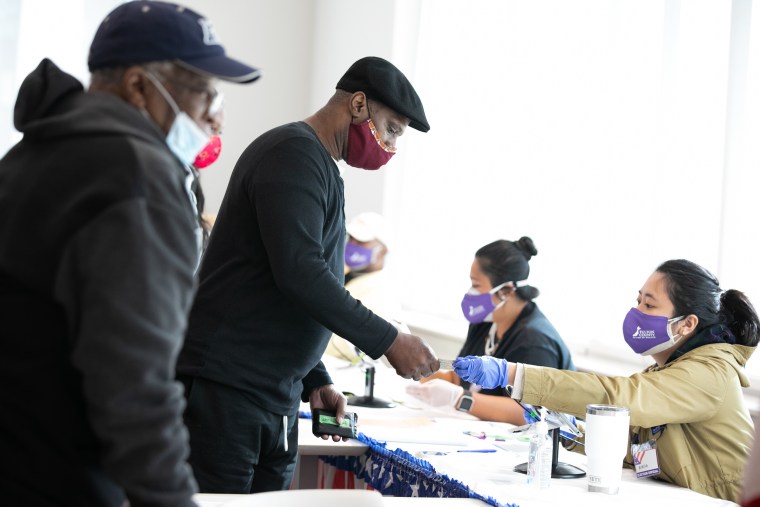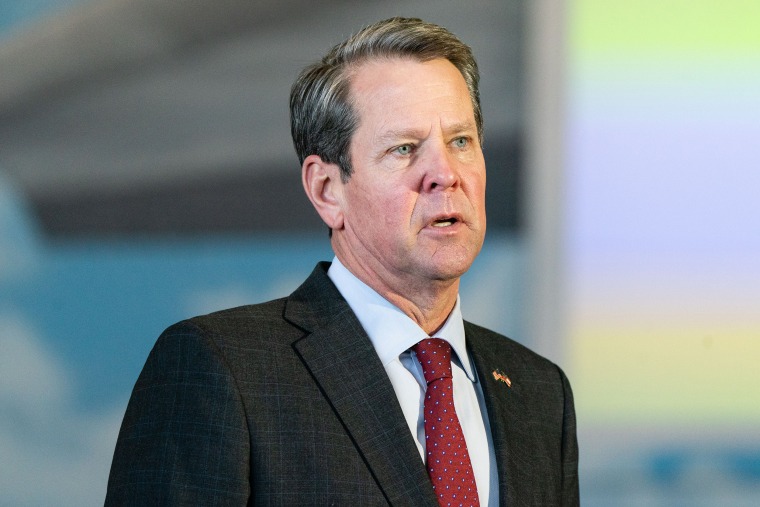After 15 years allowing voters to cast absentee ballots without excuses, Georgia Republicans say the practice has got to go.
On Monday, the Republican-controlled state Senate passed a package of legislation that would, among other things, limit mail-in voting primarily to Georgians who are elderly, disabled or out of town on Election Day — one of dozens of restrictive election-related measures under consideration in state legislatures.
Supporters of the measures, who include allies of former President Donald Trump and those who stood up to his bogus allegations of fraud after Joe Biden upset decades of Republican dominance to win the state, say the bills are commonsense election security efforts. Democrats, voting rights advocates and civil rights groups say something else is going on.
"It's pathetically obvious to anyone paying attention that when Trump lost the election and Georgia flipped control of the U.S. Senate to Democrats shortly after, Republicans got the message that they were in a political death spiral," state Rep. Renitta Shannon, a Democrat from Decatur, said during a floor debate over the Republican proposals in Georgia last week. "And now they are doing anything they can do to silence the voices of Black and brown voters specifically because they largely powered these wins."
The Senate bill and other restrictive voting laws passed by one chamber of Georgia's General Assembly are expected to end up in conference committee, where lawmakers will seek to reconcile competing legislation into a final piece of legislation.
Grassroots organizers say Georgia, which just elected two Democrats to the Senate, flipping the seats from red to blue, is ground zero for a movement happening across the country. State Republicans have introduced at least 253 restrictive voting bills in 43 states, according to the Brennan Center for Justice at the New York University School of Law, and because they control the majority of legislatures across the country, at least some of the proposals are likely to pass. In the fall, state Republicans will also control far more of the redistricting process than Democrats, and experts say lawmakers could easily gerrymander Republican House majorities.
"A lot has been written about the fact that the U.S. is going to be majority people of color — 2040, 2050 — well, that's 2024 for us here in Georgia," said Nsé Ufot, a voting rights advocate who leads the New Georgia Project, a group that aims to engage and register new voters.
Ufot argued that the proposals amount to blatant voter suppression in a state that had already erected major barriers to the ballot box.
"So we're talking about three years from now, four years from now, Georgia will be a plurality, white people will be the minority in Georgia," she said. "And there are some people that are deathly afraid about that. And they're doing everything they can to break the machinery or break the machinery of our democracy to hold on to power for as long as they can."
Voting rights experts and civil rights groups have argued that, taken together, the movement adds up to a national assault that would push voters of color out of the electorate and that federal voting rights protections — like H.R. 1, which passed the U.S. House last week — are badly needed to ensure equal access to the ballot box.
"Those policies, in large part, would protect voters from some of the efforts that we're seeing in states across the country," said Eliza Sweren-Becker, an attorney at the Brennan Center who tracks restrictive and expansive voting proposals in states. "For example, H.R. 1 would implement Election Day registration, a policy that some states are trying to repeal. H.R. 1 would implement automatic voter registration, again, a policy that's a target of states like Georgia and Arizona, so it would really protect voters."
While the White House has indicated voting rights are a priority, issuing an executive order Sunday aimed at expanding voter registration, the sweeping reforms advocates want appear likely to be stalled in the closely divided Senate. Democrats control only a slim majority with Vice President Kamala Harris as the tiebreaking vote, and many Democratic senators have reiterated their opposition to eliminating the 60-vote threshold to pass nearly every piece of legislation, a rule known as the filibuster. Meanwhile, an attorney for the Arizona Republican Party offered a blunt reason for defending the state's voting restrictions before the Supreme Court last week: The measures help Republicans win elections.

Debate over election laws in Georgia has been marked by last-minute hearings, hurried rewrites and furious floor debates. The House created a Special Committee on Election Integrity to corral bills.
John Cusick, a lawyer with the NAACP Legal Defense and Education Fund who is tracking the proposals, said last-minute 7 a.m. hearings had been scheduled the nights before, Zoom testimony had been prohibited and hearings had been conducted without fresh copies of bills in hand.
"They've been not open, not transparent and not inclusive," he said.
A pair of dueling omnibus packages — one in the House and one in the Senate — and a small army of standalone bills tackle everything from early voting hours to automatic voter registration and drop boxes. Some proposals would limit weekend early voting in some counties, which is popular among Black voters who organize "souls to the polls" events at churches.
"All of these by themselves are challenging," Cusick said. "And then when you start putting them together and you see the ways that they're interacting, it just exacerbates all of the harms, especially for voters of color who are being disproportionately impacted."
Republicans say it is about bringing back trust. Many GOP voters believe Trump's lies that the election was stolen, according to public opinion polls.
The House's omnibus bill is "designed to begin to bring back confidence of our voters back into our election system," the Georgia bill's sponsor, state Rep. Barry Fleming, a Republican from Harlem, near Augusta, said in a floor speech on March 1.
Georgia's Republican-controlled Legislature, in particular the Senate, has cast doubt on the integrity of the election system over the last year. The Senate hosted hearings to investigate allegations of fraud in early December, inviting Trump's conspiracy-peddling attorney Rudy Giuliani, who is being sued for defamation for advancing baseless conspiracy theories, to make fantastical claims before a subcommittee.

Once Georgia lawmakers nail down a package of bills they hope to become law, the buck passes to Republican Gov. Brian Kemp, who faces a difficult political decision if some of the more extreme measures are sent to his desk for his signature or a veto.
Kemp, like Republican Secretary of State Brad Raffensperger, faced Trump's ire for defending the integrity of the contest and not overturning Biden's win in the state. Both have said they support voter ID for mailed ballots while demurring or obliquely resisting proposals like ending mail-in voting for most eligible residents.
"At the end of the day, many of these bills are reactionary to a three month disinformation campaign that could have been prevented," Raffensperger said in a statement, saying his office was reviewing the proposed bills.
Vetoes would risk enraging Trump supporters, and they could invite a primary challenge in Kemp's 2022 re-election race, while allowing such a bill to become law would give Democrats ample fuel in their challenges.
Trump has hinted that he could get involved in a primary challenge to Kemp, too.
"Doug, you want to run for governor in two years?" Trump said at a Georgia rally in December, referring to outgoing U.S. Rep. Doug Collins, a Republican. "He'd be a good-looking governor."

